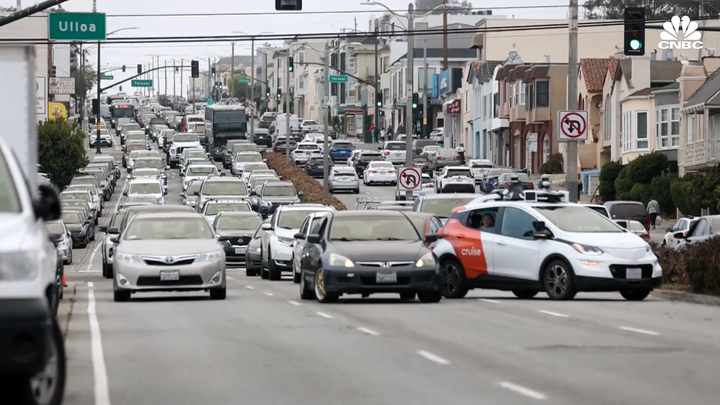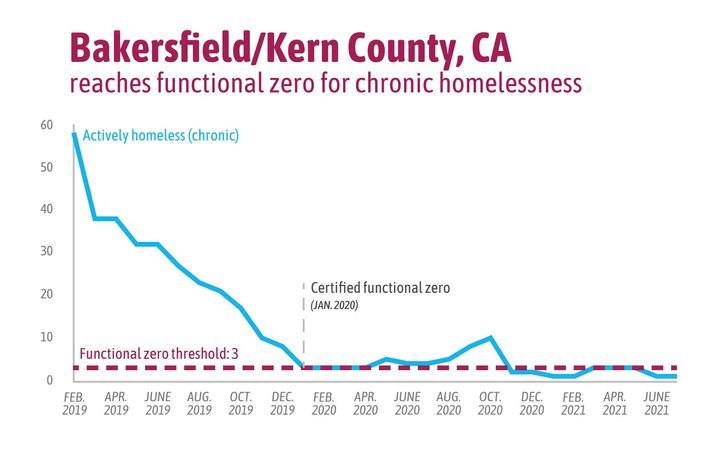There's no worthy conversation around designing the American people a digital citizenship
Give American citizens the world-class digital identity we're capable of creating, now.
You can find ways America lags behind other similar or smaller nations in implementation of technologies, the disparity in access always the clearest between classes, be it race, wealth, or geographic location. Density of high speed wireless internet quickly turns to the "is there internet at all" side of scale as you travel out to rural communities. Baby Bells famously promised brand new high speed digital infrastructure across much of the United States, and then simply refused to produce. An abused and ignorant populace has basically been given no tooling for even attempting to connect to the human conversation as is possible today. The classic situation then; the ignorant advocating for the rights they don't know they need.
The tools the human species has developed over the last 40 years, dense networking and ubiquitous cellular handsets, the global internet backbone, allow for an incomprehensible amount of collaboration and communication. Had these tools been present at some of the most difficult moments in human history perhaps great battles would be remembered differently and international borders would lie in new places altogether. It is important then to think about how we may make best use of these tools in the great battles of today, when international borders lie in new places.

The inability to ensure equal access to modern technology results in something called the digital divide. From the National Telecommunications and Information Administration (NTIA):
Ensuring access to the fundamental tools of the digital economy is one of the most significant investments our nation can make. Our country's most important resource is its people. Our companies are only as good as their workers. Highly-skilled, well educated workers make for stellar businesses and create superior products. In a society that increasingly relies on computers and the Internet to deliver information and enhance communication, we need to make sure that all Americans have access. Our domestic and global economies will demand it. Ready access to telecommunications tools will help produce the kind of technology-literate work force that will enable the United States to continue to be a leader in the global economy.
Like much modern American legislation, the American people have no voice on matters pertaining to their digital rights. Digital rights issues are rarely addressed by congressional action, and when it seldom is the subject of scrutiny, those scrutinizing are unwilling legislators; too far removed from a momentously foreign digital grid. The conversation is then instead occupied by lobbyists and industry interest groups operating unduly unchecked.
This results in a trove of instances to be used as evidence that the information of and about us we generate unknowingly every day is used to carry out harm, both purposefully by malicious actors and unintentionally by lackadaisical controls and ignorance in development and operation of software. Instances of pregnancy outed to family by targeted advertising, or stalking cases by employees with inappropriate levels of access.
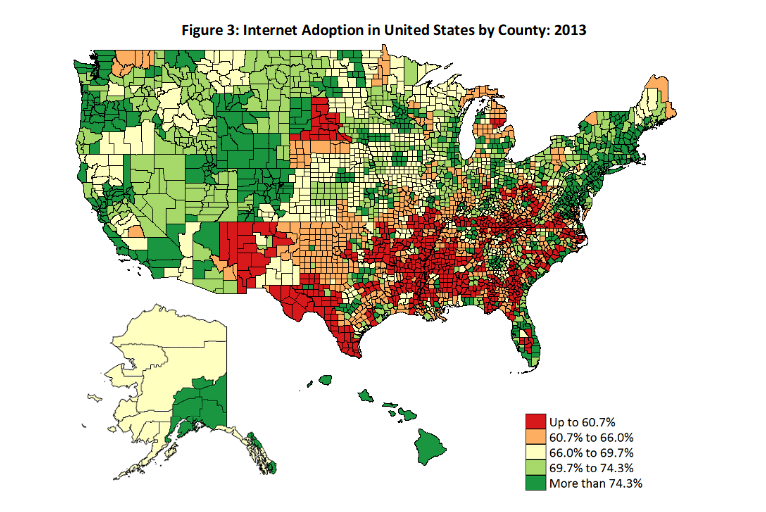
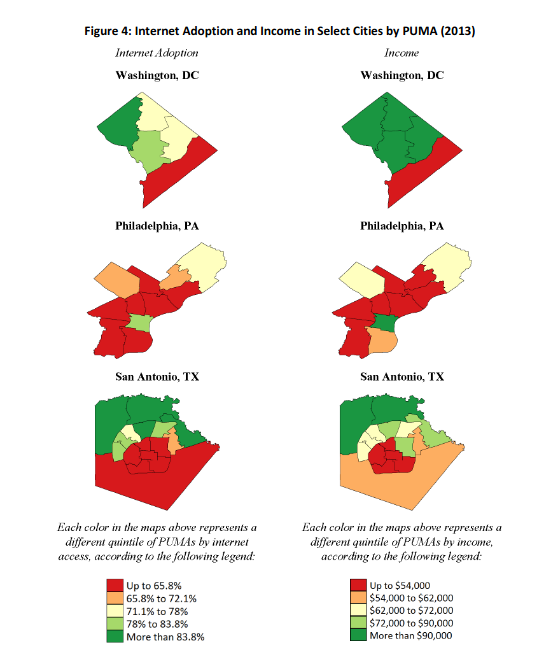
Retrieved from "Mapping the Digital Divide" Council of Economic Advisers Issue Brief, July 2015
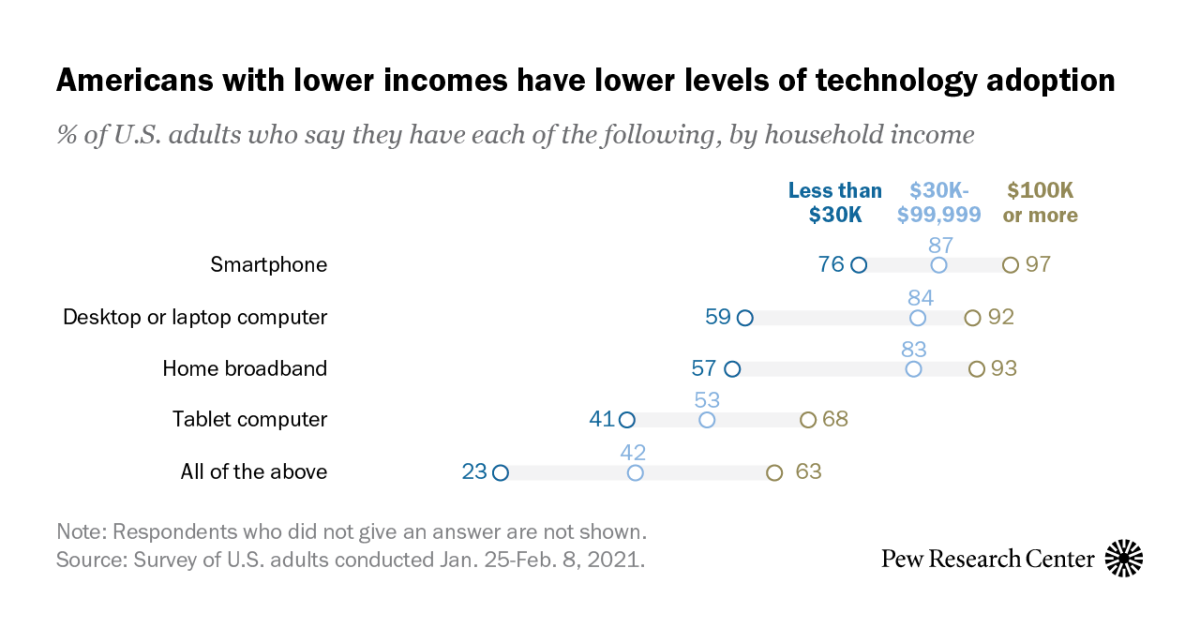
There are few oases in the hell-scape but there have been some small recent victories. At the state level some have begun to lay groundwork for building resilient digital structures. With them, we could more efficiently and more safely represent ourselves, our economy, and our country. California's Consumer Privacy Act (CCPA) allows for some basic provisions:
- Right to know; how and what data is collected and used
- Right to delete; mostly
- Right to opt-out of commercial use of data
- Equal protection of consumers under this law
With a fresh set of eyes this is laughably oppressive. Working to narrow the digital divide would naturally foster policy and infrastructure that would, by default, work to reverse harmful digital rights practices. Appeal to Reason offers this as a call to technologists, lobbyists, and citizens alike to confer on an new set of national human-focused digital rights acts.
Acts that would guarantee:
- Right to secure digital representation; deprecating the use of Social Security Numbers (SSN) for much of their current common usage
- Right to basic secure storage, tiered, as a public forum and service
- Right to reasonable connectivity for status quo user experience
- Right to digital death; entombment of your digital representation upon your actual demise
You've just welcomed your new child
Congratulations. The delivery was a whirlwind of course and there's still so much to do around the house but you have a moment to yourself and you want to get through all the paperwork this is. Luckily for you you live in a world created for the duration of this allegory populated by companies that provide common identity gateways that adhere to a nationally specified digital representation specification. There are a few, and all services available to one have to be available through the others, meaning you can provide your same information to any of them and your experience remains consistent. It also makes it harder to attack, and provides resilience in cause of disruptions.
- Connect with your identity provider.
- Provide authentication and authorization.
- Complete the "New Birth" workflow;
- Fill in identifying information
- Attach records the hospital gave you
- Set up emergency contact or medical alert information
- Receive soft tokens for authentication to this new minor profile
- Receive hard tokens at a later date in the mail
They're older now, school aged...
...and they need to be creating projects, working on them at school and at home, or wherever they might be luckily enough to go while they navigate learning what's valuable in life. They can work on those projects whenever and wherever they need to by enjoying a set amount of digital worldwide storage provided to the school, either by the government or by private industry on contract much like how is currently done. Ideally by a group of people with local investment to the facility working with reliable federal assistance. With important distinctions however; retention is low, and confined to the pupils in the school while they are active students. The data should be turned over and used again as children move through the grades to keep cost reasonable and to enforce mindfulness of their digital footprint. They can take whatever they'd like on as they graduate, but if they leave it, it will blink out.
If your family needs to travel internationally, you could request passports with a sufficiently hardened government account, or perhaps instead submit an intent to travel that would be interoperable behind the scenes of your trip; allowing you seamlessly through customs and visas. We should improve our digital citizenship to improve our representation domestically: as a chorus of voices; as we should to improve our experience abroad: as a leader on the human/virtual borders.
Finally, when your child is all that remains of you...
...they will carry access to your digital remains as they do the instructions to visit your grave-site, special place, or simply your shared memories. The information that was used to register your child and schedule trips, that stored 4th grade presentations and recorder performances, should be gone as you are.
Never truly of course, there is no reason to force the pain of true severance upon cherished memories, but digitally dead. Unplugged from the global moment, inaccessible to go scrolling back through social media feeds. There's always so much paperwork to do with people coming or going of course, so your child connects up to an identity gateway:
- Log in, whatever future MFA this time
- Complete the "Death" workflow
- Log in again, this time as your deceased parent
- Select "I am dead"
- Log out
Some time later your kid receives some government mail. It means your data is cold, there are only three copies of it now. A backup, a secondary backup, and the copy that's in this envelope. It's largely overwhelmingly trash. Raw logs of times and dates of logins and session activity. Applications, both approved and rejected, for all sorts of things. Financial data. Employment and property histories. There's an endless amount.
But with endless value to one navigating the recent death of a family member. Bank details, the information needed to cancel a litany of subscriptions. A folio of answers to questions that can't be asked of you anymore. Treasures hidden away in audio recordings of singing to hold music in calls recorded for quality assurance purposes. Passport photos across every decade of your memories.
The only true portion of this morbid little story were the examples of data collected
It's largely overwhelmingly trash. Raw logs of times and dates of logins and session activity. Applications, both approved and rejected, for all sorts of things. Financial data. Employment and property histories. There's an endless amount.
All of this data is currently collected by various organizations around the world, including but not limited to the United States government. Time and duration of phone calls from carriers, recent destinations from cloud navigation services, dates and times connected to specific cellular infrastructure. What the Federal machine has been able to do over the last 40 years while blinding the populace's digital eye is worm their way into those organizations and vacuum the data up. There's so much of it that they can't possibly keep it forever, but it's expansive enough that when they need to, it's pitifully easy to start a folio on any one person. You may be surprised at how much you may be able to glean about a person with just information about their information. Once collections starts agencies can use justifications within the legal system to expand the scope of collection and time of retention. It's optimized automated surveillance.
To further our lifecycle example above, since the original publication of this article, multiple readers and friends have commented about the difficulty they've had with identity theft and protection around their newborns and young children. The relatively basic "magic numbers" of identity for newly born or young children are the perfect mix of blank slate, rarely checked, and readily available. Raising children is hard enough if you're able bodied and with a reliable partner. Throw having to resolve fraudulent debts on stolen lines of credit for your six year old in with all the rest of life's horrors. 5/10/23 - JB
You know your data is already out there
Across every digital service you've ever used there's basically no chance you've never had an email and password compromised, you may not even know if that's the case; but I can tell you now, it is. Hopefully you don't use that specific set of credentials anywhere else, but chances are again that you do. Hopefully you've rotated the credentials with any regularity, but again, this author wouldn't bet on it.
There is of course relative safety in the vast numbers of users and services that are globally interconnected. You may be able to avoid inconvenience just as you are life shattering identity theft; pure chance.
But this is not norm. The United States government, along with significant contributions from private industry, is largely responsible for the creation of our metaverse, and it remains largely the wild west outside of constricting commercial interests. Earlier in this diatribe the digital divide was mentioned. There's an entire population of the country that's absent from this mess; those that are actually present are tracked and examined and the information is available to the highest bidder.
There is a reason this argument is so federally-focused. It's because within the population of American citizens there are those that either work directly for federal agencies, or are close enough in collaboration that their meta-data/data itself is shared. These are higher value targets, like the Office of Personnel Management (OPM). Leading in digital citizenship is a matter of national security that has remained absent from public discussion.

Is this author only going to complain?
The private privacy industry space is a small one, but there are still currently available solutions that can be either implemented or modeled after for better protection of consumer and private-party data. A project called Solid, developed by Tim Berners-Lee's company Inrupt, provides logical organization of consumer data in groups called "pods" with common access protocols, controls, and accountability. Medical records, tax information, state licensure, all could be stored and accessed per pod per citizen, increasing interoperability and value to the individual, while also providing more security than current concepts.
Even with a perfect implementation of 'identity gateways'...
Leaks and misuse of access to data would still occur; perfect security is impossible. The best security you can get though, is keeping things up to date, having controls for its misuse, and, most importantly, knowing when it is misused. Even attempting at building such a system could merit progress and value in adjacent places like making a census more accurate. If you had been the victim of identity theft, government for the people, by the people, would be making sure that you were able to turn over your digital identity, and migrate your assets to the new one.
There are so many other tangible benefits
Ever had taxes returned to you for corrections?
The forms come back with instructions of varying detail and clarity. Sometimes the answer is obvious; a set of mistyped dates on stock trades, others require additional verification. Regardless of the type of error returned, if the government is going to be deciding whether or not how you've accounted for your taxes is accurate, why are you submitting any of your own work at all?
If they need you to be verifying information or amounts that's fine; have the correspondence occur through a tax portal and collect confirmation and acceptance of the math involved.
Nigh unbelievably, both sides of the aisle have previously proposed federal return-free filing, with interest being expressed from the executive branch in 1985, and in 2009. However, lack of protection for Congress from tax-preparation industry interests hamstrung action that would make the life of every American citizen slightly easier come tax season. Direct congressional opposition to government by the people, for the people.
No place like Homecoin
Cryptocurrency is such an expansive and relevant subject to the matter at hand that it must be mentioned, but cannot be discussed.
Thus cryptocurrency let thy be mentioned, and let thy speak for thyself.
Congratulations to you
If you truly made it all the way through this piece. The title is too dense, but it is the truthful way to represent the ideals laid out in the words above.
- Unequal and unjust access to technology
- Unjust protection under said technologies
There is no worthy conversation about digital citizenship.
Our tools could be the greatest asset to democracy and the voice of the individual to have ever been conceived. It should be so; as designers of society instead of cowering against wielders of power over computers.



